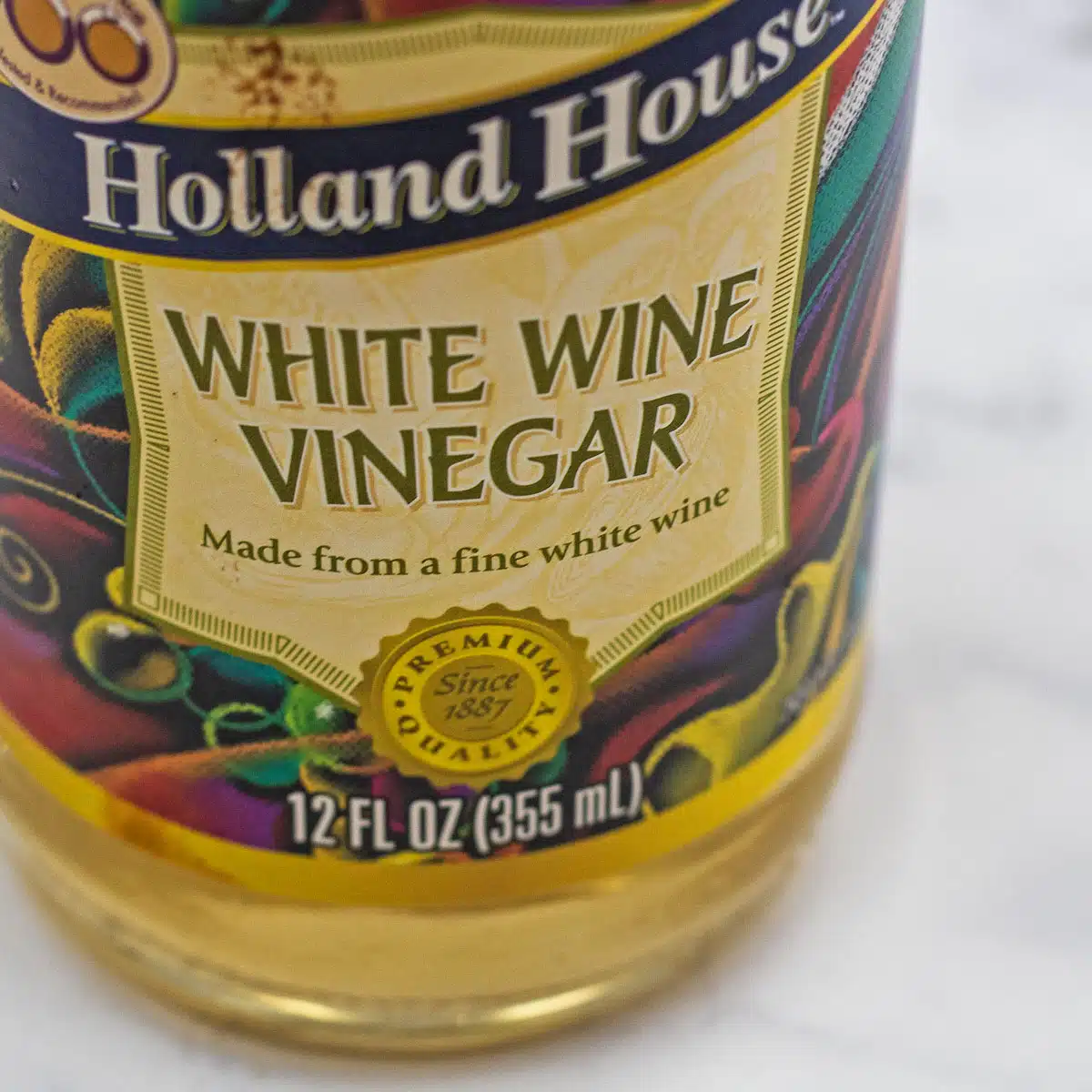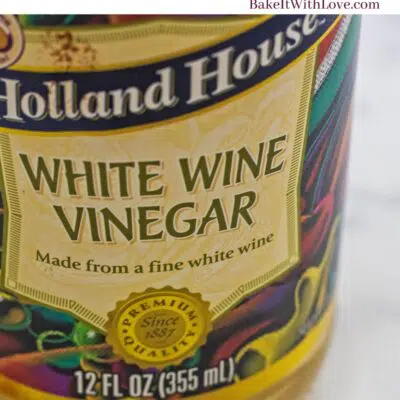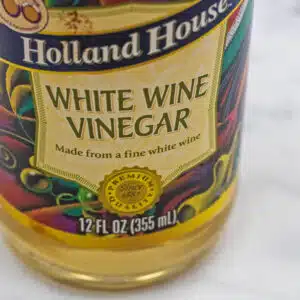When you need the best white wine vinegar substitute while cooking, check out this thorough list of easy alternatives! There are several great substitutions to help you out in a pinch when you've run out of white wine vinegar!

A list of great choices to swap for white wine vinegar no matter the recipe!
White wine vinegar is the perfect ingredient to elevate the flavor of a dish with a bright and tangy taste. It is a common ingredient in making salad dressings and marinades. It can also be added to sauces, and pairs particularly well with fish and other seafood dishes.
This delicate and bright condiment is also a popular choice for adding flavor to white sauces. French cuisine is especially well known for using white wine vinegar in this way.
Jump to:
- What is White Wine Vinegar?
- The Best Substitutes for White Wine Vinegar
- 1. Champagne Vinegar
- 2. Sherry Vinegar
- 3. Rice Vinegar
- 4. Red Wine Vinegar
- 5. Balsamic Vinegar
- 6. Honey Vinegar
- 7. Lemon Juice
- 8. Apple Cider Vinegar
- 9. Fruit Vinegar Varieties
- 10. Herb Vinegar
- 11. White Wine
- 12. White Vinegar
- How to Choose the Best White Wine Vinegar Substitute
- 📖 Recipe Card
- 💬 Comments & Reviews
If the French are a fan of it, then you can probably guess it is not just a basic white vinegar. What exactly is it then?
What is White Wine Vinegar?
While this tangy liquid has a similar acidic aroma to other kinds of vinegar, the taste is much different. It is less sharp on the tongue than regular distilled white vinegar. Even apple cider vinegar, which is another popular ingredient in dressings and marinades, has a bit more of a bite.
White wine vinegar is made from fermenting white wines. The result is a tangy and aromatic vinegar. In contrast, regular white vinegar (or distilled vinegar) is made from fermenting grain alcohol.
It is the difference in the alcohol base that gives white wine vinegar a lighter and more delicate taste. White wine vinegar also has a slightly sweeter taste and less acidity than distilled vinegar. These are a couple of reasons why white vinegar is not the best substitute for white wine vinegar.
The Best Substitutes for White Wine Vinegar
While regular white vinegar is not the best substitute for white wine vinegar, it can do in a pinch. However, before just choosing what will work in a pinch, see if any of these other substitutions for white wine vinegar are an option!
1. Champagne Vinegar
If it is simply a matter of not being able to find white wine vinegar at the store, then look for champagne vinegar. Champagne vinegar provides the closest flavor profile to white wine vinegar. This makes it the perfect choice for a substitute in any dish that calls for white wine vinegar.
The acidity and overall flavor of champagne vinegar is a bit milder than white wine vinegar though. So, use a 1 ½ to 1 ratio: 1 ½ tablespoons of champagne vinegar for 1 tablespoon of white wine vinegar.
2. Sherry Vinegar
While sherry vinegar has an overall more subdued flavor than that of white wine vinegar, it has its own distinctive taste that comes through. The overall flavor profile is still quite close to that of white wine vinegar though, making it a great substitute for any recipe.
However, sherry vinegar does have a darker color, so while it may not affect the taste, it won't be the ideal aesthetic choice for white sauces.
Sherry vinegar is an easy 1:1 exchange for white wine vinegar.
3. Rice Vinegar
Rice vinegar is made from fermented rice. It is mostly used in Asian cooking but is a great option as a substitution for white wine vinegar in any cuisine.
Its flavor profile is quite close to white wine vinegar, while also having a similar appearance. Therefore, rice vinegar is a good option for those light-colored sauces that sherry vinegar or red wine vinegar aren't ideal for.
Easily swap out white wine vinegar for equal parts rice vinegar in a 1:1 substitution.
Notes on Using Rice Vinegar
Make sure you are using regular rice vinegar, and not seasoned rice vinegar. Seasoned rice vinegar has added salt and sugar that provides a distinctly different flavor profile.
Rice vinegar is not the same as rice wine. Rice wine does not provide the acidity of the vinegar that you are looking for. However, rice wine vinegar is a term often used interchangeably for rice vinegar.
4. Red Wine Vinegar
Like white wine vinegar, red wine vinegar is made from wine. Therefore, while it is a slightly bolder flavor, overall, the taste is very similar to white wine vinegar.
This makes it a great choice for most recipes that call for white wine vinegar. Keep in mind that it is made from red wine, so you may not want to use it in a white sauce or vinaigrette.
Red wine vinegar is an easy 1:1 substitution for white wine vinegar.
5. Balsamic Vinegar
Balsamic vinegar has a bold and sweet taste that is quite different from white wine vinegar. That isn't to say it can't work in certain recipes though.
The bolder flavors of balsamic vinegar can be a fun substitute to add a rich sweetness to meat dishes. Due to its darker color, bolder flavor, and thicker consistency though, avoid using it in lighter flavored (and colored) dressings and sauces.
In most recipes that you can use balsamic vinegar, it can be used in equal parts for white wine vinegar. The boldness of this vinegar can quickly overpower a dish though, so I suggest starting with half the amount the recipe calls for and adding more as you desire.
6. Honey Vinegar
Depending on where you live in the world, you may not know that honey vinegar is a thing! In certain parts of Europe though, honey vinegar is quite common. Especially in Spain and Italy.
If you come across honey vinegar it is worth trying! It is also an amazing substitute for white wine vinegar, offering a very similar flavor profile.
Use honey vinegar in an equal swap for white wine vinegar in any recipe.
7. Lemon Juice
Out of all the substitutes you can use for white wine vinegar, lemon juice may be the one you have most easily available. Lemon juice offers the tang and acidity of white wine vinegar.
On the other hand, lemon juice tastes distinctly like citrus. If you don't have access to another vinegar substitute you can use lemon juice in salad dressings. It can also work in certain dishes with fish and chicken.
Replace white wine vinegar with half the amount of lemon juice + half the amount in water.
For example, for every tablespoon of white wine vinegar use ½ tablespoon of lemon juice + ½ tablespoon of water. This will help cut some of the lemon taste, while still providing the acidity of the lemon.
8. Apple Cider Vinegar
Apple cider vinegar is popularly used as a base ingredient in many dressings and marinades. It offers a bigger and bolder taste than white wine vinegar though, so you will have to use your judgment on which dishes to use it as a substitute in.
In general, apple cider vinegar can work for salad dressings, sauces, and marinades that are paired with fish or chicken.
While you may work up to a 1:1 exchange of apple cider vinegar for white wine vinegar, due to its strong flavor I suggest starting with ½ the amount the recipe calls for. Then, taste test and add more as desired.
Note on Using Apple Cider Vinegar
Apple cider vinegar is best used as a last resort. However, it is a better choice in a pinch than regular white vinegar.
9. Fruit Vinegar Varieties
Apples are not the only fruit being used to make vinegar. There is an assortment of other fruit vinegar, such as lemon and even berry vinegar.
While less common to have it just hanging around in your cupboard, if do find yourself with fruit vinegar on hand it can be used in certain dishes. The brighter flavors of fruit vinegar work particularly well with white fish, poultry, or light vinaigrette dressings.
The acidity level of most fruit vinegar will be equal or lesser to that of white wine vinegar. Therefore, you can start with a 1:1 substitution. Feel free to add more as needed to get the desired flavor.
10. Herb Vinegar
If you make your own homemade vinegar or frequent the local farmer's market, then you may have a lovely homemade herb vinegar on hand. How you can use an herb vinegar as a substitute will depend on what herbs have been used to make the vinegar.
Common herb vinegars are made with rosemary, thyme, or oregano. While these won't work as a flavor exchange in all recipes, they may work well for certain salad dressings or marinades.
You can use an herb vinegar as an equal 1:1 exchange for white wine vinegar. Keep in mind the herbs will offer their own additional flavor, so you may want to use fewer seasonings throughout the recipe.
11. White Wine
White wine may be one of the substitutes that you naturally have on hand. While white wine vinegar is made from white wine, the important difference is that the vinegar has a higher acidity level than the wine it is made from.
Therefore, using white wine as a substitute for vinegar will result in a dish with less of a tang. If you don't' have another vinegar option on hand though, or prefer a less acidic dish, then go ahead and grab that bottle of wine!
Use white wine in a 2:1 exchange for white wine vinegar - 2 tablespoons of wine for every 1 tablespoon of vinegar.
12. White Vinegar
As mentioned earlier, if you find yourself in a pinch, then white vinegar can be used as a substitute. However, white vinegar has a bigger bite to it and needs a few adjustments to work well as a white wine vinegar substitute.
To balance the acidity of white vinegar, you will want to combine it with a bit of sugar and water.
For every tablespoon of white wine vinegar, use ¾ tablespoon of white vinegar mixed with ¼ tablespoon water and a pinch of sugar. Mix well before adding to your recipe.
Note on Using White Vinegar
Even with these modifications, it is still best to only use this as a substitution in pickling or brining recipes. In other dishes, it may still feel too harsh as a replacement for the delicate flavors of a dish calling for white wine vinegar.
How to Choose the Best White Wine Vinegar Substitute
Choosing the best substitute for white wine in your recipe will be based on the acidity, overall flavor, and even color you are aiming for in the final dish. For the closest overall flavor profile, complete with similar acidity and coloring, choose champagne vinegar, rice vinegar, or honey vinegar.
For flavor and acidity alone, try sherry vinegar or red wine vinegar. All of these options can also be used for brining or pickling.
If these options are not available, then explore what you have in your cupboard and compare them to the other suggestions listed in this article. Even if you have a slightly different flavor in the end, any of these can be a great way to still enjoy a delicious white wine vinegar inspired dish.
We hope this article helped you choose the perfect white wine vinegar substitute. Let us know how your dish turned out by dropping a comment below!
Do you love a recipe you tried? Please leave a 5-star 🌟rating in the recipe card below and/or a review in the comments section further down the page.
Stay in touch with me through social media @ Pinterest, Facebook, Instagram, or Twitter! Subscribe to the newsletter today (no spam, I promise)! Don't forget to tag me when you try one of my recipes!
📖 Recipe Card
White Wine Vinegar Substitute: Best & Easiest Substitutes To Use In Cooking!
Ingredients
Option 1 Best Overall Substitute - Champagne Vinegar
- 1 ½ tablespoon champagne vinegar
Option 2 Best General Substitute - Sherry Vinegar
- 1 tablespoon sherry vinegar
(Note: 2x or 3x only changes the ingredient list)
Instructions
Option 1 Best Overall Substitute - Champagne Vinegar
- Use champagne vinegar in 1.5 times the amount of white wine vinegar called for in your recipes.
Option 2 Best General Substitute - Sherry Vinegar
- Use sherry vinegar in an equal 1:1 amount of the white wine vinegar that your recipes require.



Comments
No Comments